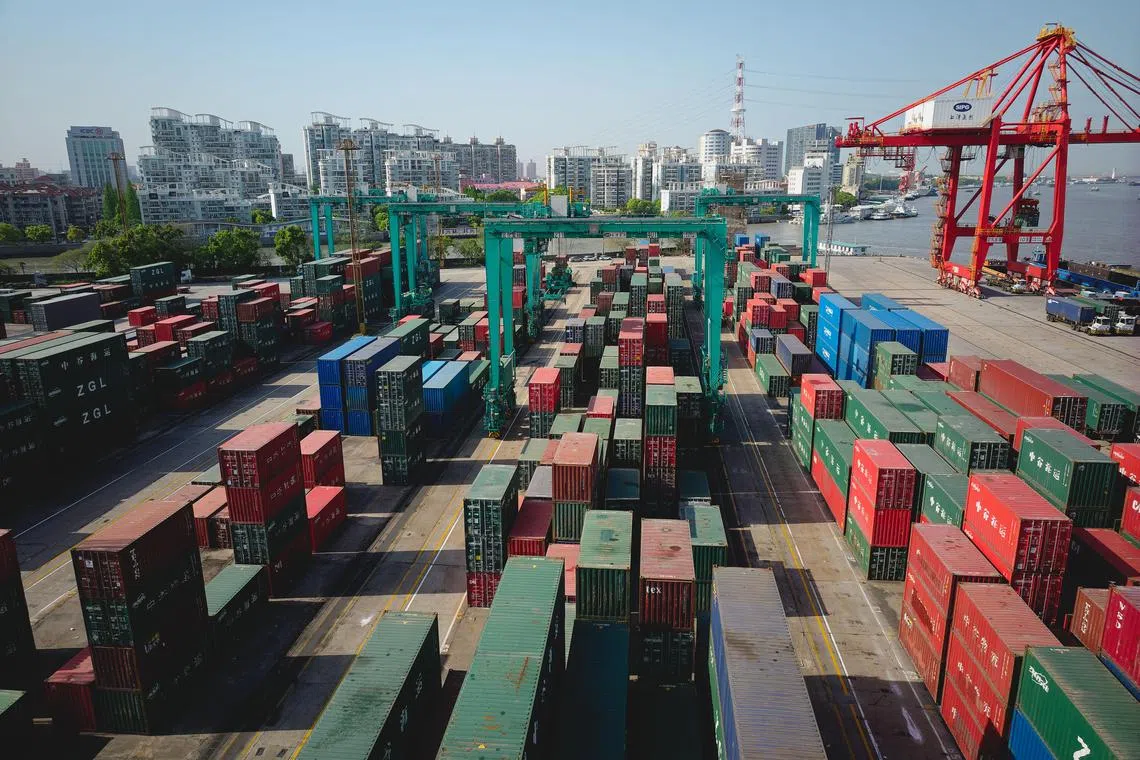Beijing slams ‘appeasement’ of US in trade deals that hurt China
Sign up now: Get insights on Asia's fast-moving developments

Washington and Beijing have imposed eye-watering duties on imports from each other, fanning a stand-off between the economic superpowers.
PHOTO: EPA-EFE
Follow topic:
BEIJING – China on April 21 hit out at other countries making trade deals with the US
While the rest of the world has been slapped with a blanket 10 per cent tariff, China faces duties of up to 145 per cent on many products.
Beijing has responded with tariffs of 125 per cent
Parallel to Washington’s full trade war against top economic rival China, a number of countries are now engaged in negotiations with the US to lower tariffs.
The finance and trade ministers from South Korea – a major exporter to the US – will hold high-level trade talks in Washington this week, Seoul said.
South Korean giants such as Samsung Electronics and automaker Hyundai stand to take a hefty hit if the White House goes ahead with its threatened tariffs.
Japanese Prime Minister Shigeru Ishiba said on April 19 that talks between Japan and the US could be a “model for the world”, after Tokyo’s tariff envoy Ryosei Akazawa visited Washington and met President Donald Trump last week.
“The fact that President Trump came out (to negotiate with Japan’s envoy)... shows he sees talks with Japan as important,” he told the country’s Parliament on April 21.
“Japan is their ally and the biggest investor and job creator in the US,” Mr Ishiba said.
Tokyo and Washington are due to hold more talks soon, but the Japanese Premier also said that substance was more important than speed.
“They (the United States) are not in a hurry and we think haste makes waste.
“At stake is how substantive (the negotiations) will be rather than how quickly they proceed,” local media quoted Prime Minister Ishiba as saying.
Reports have suggested that as concessions for Mr Trump, Japan might increase imports of US soya bean and rice, or relax car safety standards.
But Mr Ishiba said on April 21 that “be it cars or agricultural products, we will not do anything that will affect safety”.
US Vice-President J.D. Vance arrived in India
But Beijing warned nations on April 21 not to seek a deal with the US that compromised its interests.
“Appeasement will not bring peace, and compromise will not be respected,” a spokesperson for Beijing’s Commerce Ministry said in a statement.
“To seek one’s own temporary selfish interests at the expense of others’ interests is to seek the skin of a tiger,” Beijing said.
That approach, it warned, “will ultimately fail on both ends and harm others”.
“China firmly opposes any party reaching a deal at the expense of China’s interests,” the spokesperson said.
“If such a situation occurs, China will never accept it and will resolutely take reciprocal countermeasures,” the spokesperson added.
‘Talking to China’
Mr Trump’s tariff blitz has seen Washington and Beijing impose eye-watering duties on imports from each other, fanning a stand-off between the economic superpowers that has sparked global recession fears and sent markets into a tailspin.
Mr Trump said on April 17 that the US was in talks with China on tariffs, adding that he was confident the world’s largest economies could make a deal to end the bitter trade war.
“Yeah, we’re talking to China,” Mr Trump told reporters in the Oval Office.
“I would say they have reached out a number of times.”
He added: “I think we’re going to make a very good deal with China.”
China has vowed to fight a trade war “to the end” and has not confirmed that it is in talks with Washington, though it has called for dialogue.
Speaking alongside his Indonesian counterpart in Beijing on April 21, top Chinese diplomat Wang Yi called for “openness, inclusiveness, mutual benefit and win-win” and condemned “any form of unilateralism and trade protectionism”.
“The abuse of tariffs will seriously damage the normal economic and trade exchanges among countries,” he warned.
Beijing’s Commerce Ministry also warned about an international order reverting to the “law of the jungle”.
“Where the strong prey on the weak, all countries will become victims,” its spokesperson said.
As part of Mr Trump’s trade war, the US government has also lowered the threshold at which parcels to individuals require formal entry processing by US Customs – to US$800 (S$1,000) from US$2,500 as of April 5.
Mr Trump’s government has taken particular aim at China.
Earlier in April, Washington closed a duty-free exemption for small parcels from the country, a move that appeared to be designed to target low-cost online retailers like Temu and Shein.
In a statement in response, global shipping giant DHL said it would “temporarily” suspend the shipping of parcels worth more than US$800 from businesses to individuals in the US as of April 21.
AFP

